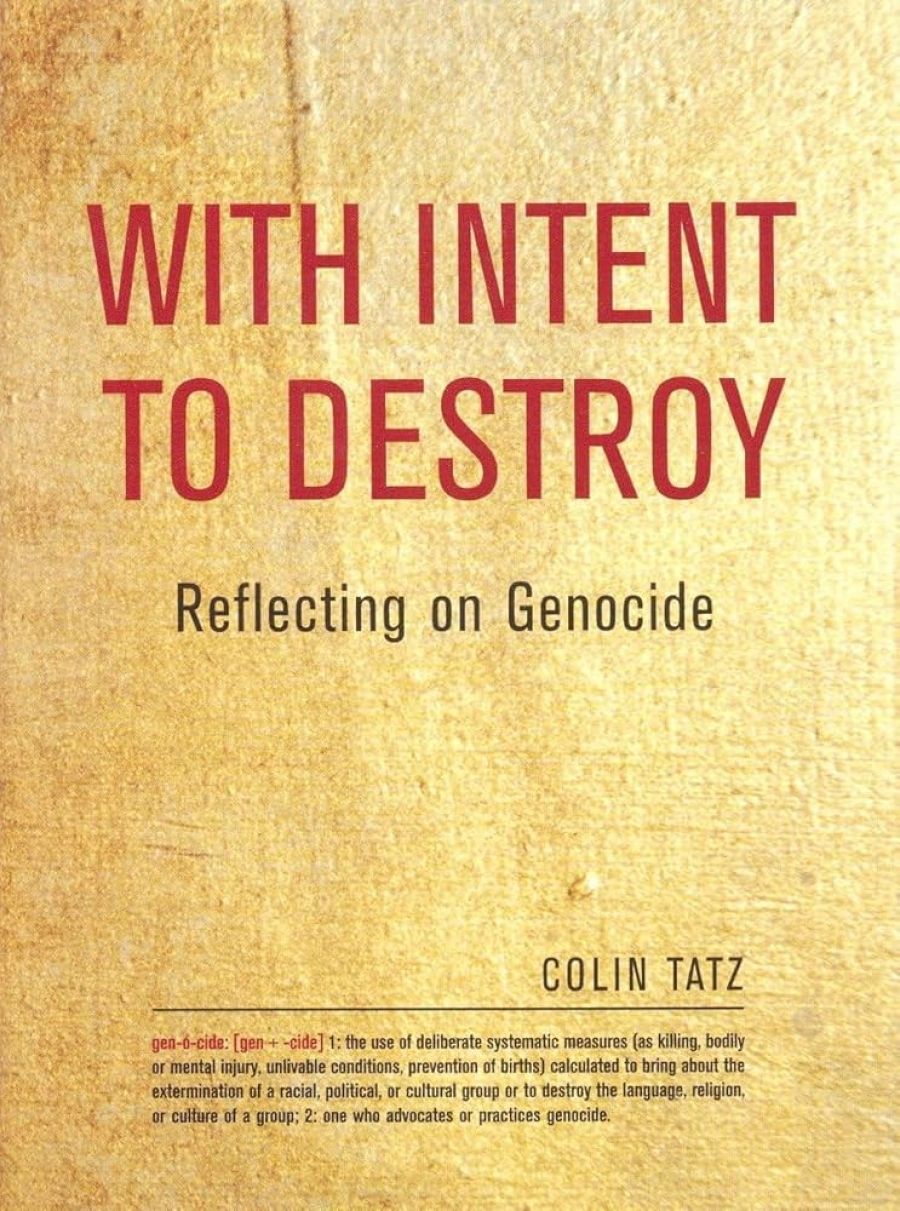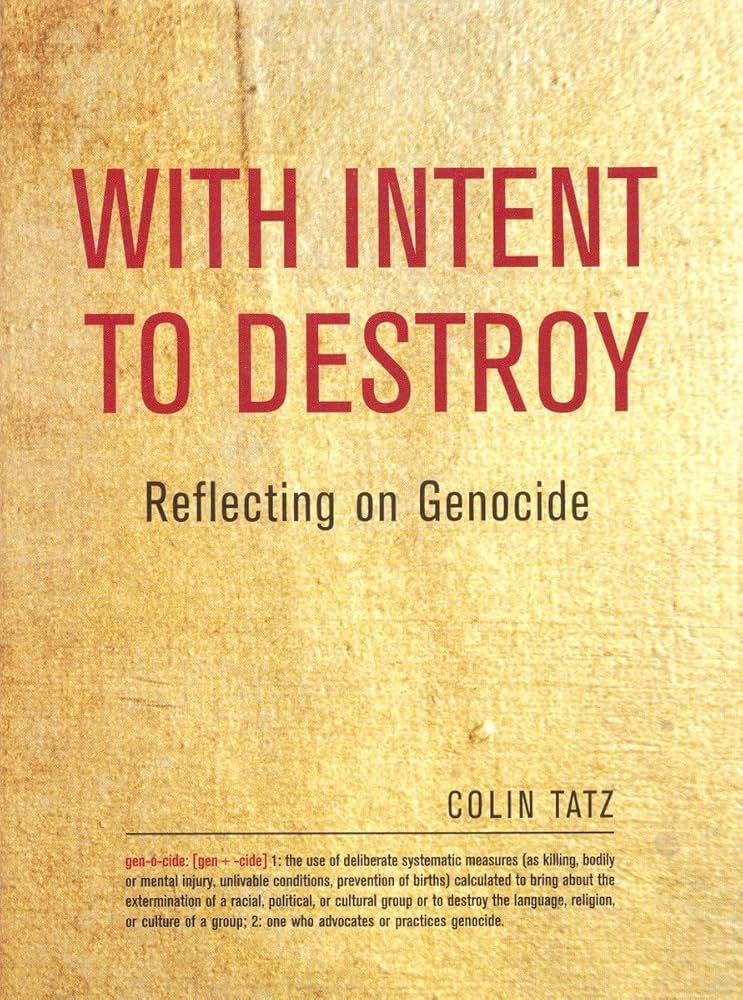
- Free Article: No
- Contents Category: History
- Review Article: Yes
- Article Title: A Forest of Distinctions
- Online Only: No
- Custom Highlight Text:
I will say straightaway what I most admire about this book. It’s the way the author is present in it, the way his voice informs the content and is informed by it. Although With Intent to Destroy is a personal book, the self does not intrude in the many bad ways it often can. It’s personal in the way real conversation is personal, made so by the presence in it of people who speak authoritatively from their experiences because, as Kierkegaard put it, they have lived their own life and no one else’s.
- Book 1 Title: With Intent to Destroy
- Book 1 Subtitle: Reflecting on genocide
- Book 1 Biblio: Verso, $49.95 hb, 240 pp
- Book 1 Cover Small (400 x 600):

- Book 1 Cover (800 x 1200):

Written by a deeply compassionate man who has devoted much of his life to the remedy of injustices to Aborigines and the relief of their misery, With Intent to Destroy is nonetheless hard-headed. Colin Tatz asks tough questions that deny moral and sentimental comfort to those to whom they are directed. Questions to the Catholic Church, revealing how inadequate was its attempt to confront the role it played during the Holocaust, are an example, as is his question to those who were inspired by the Truth and Reconciliation Commission in South Africa: did it achieve more truth and more reconciliation than trials would have? Tatz’s verdict is that it achieved less of both. A staunch supporter of trials, he argues that they produce truth while not letting states off the hook. He also understands how deep is the human need for punishment, not just in the hearts of the victims of crime, but also, sometimes, in the hearts of its perpetrators.
Common sense is often thought to be a mediocre virtue, so it might seem like faint praise to say that this is a book gratifying for its common sense. I mean it as high praise, however, for Tatz combines common sense with great subtlety, tying our thoughts to the ground while acknowledging the complexity of the terrain. If you are inclined, as surely the best part of us sometimes is inclined, to say that some crimes are beyond punishment, or that it is indecent to seek financial compensation from the Holocaust, then, just in case such thoughts produce the kind of light-headedness that lifts your feet off the ground, Tatz extends a hand to help you down and hold you there awhile.
Inevitably, Tatz’s honest voice captures the tensions intrinsic to the concept of genocide. One of these tensions shows itself in the fact that, although genocide is such a serious crime, its nature cannot be understood without first passing through a forest of fine distinctions. Once through the forest, one has to retain the capacity to see it. It’s hard. More of us fail than succeed, I think, partly because it is so tempting to become impatient with the fine distinctions. One form of this impatience manifests itself in the intolerance shown to the claim that there can be genocide though not a single person has been murdered in service to a genocidal intention. Another shows itself in a kind of moral disgust. We’ve seen the corpses piled high. What does it matter what you call this crime? Will it matter to its victims? Yet another shows itself in a readiness to call so many things genocide that the point of calling any one of them that becomes lost. Just as dangerous, however, is the tendency to become so fascinated by the distinctions that one loses a sense of experiences that made humanity reach for the concept.
Tatz insists on making distinctions – on distinguishing genocide from other crimes, and on marking moral differences between genocides. One may agree or disagree with him, but reading him one realises the need for a compassionate but tough-minded humanity if one is not to be repelled by the need to draw distinctions or to become fruitlessly (and perhaps indecently) absorbed in them. All serious thought strives to see things as they are rather than as they appear from this or that distorting perspective, but efforts to understand genocide should be efforts to achieve the kind of objectivity that never seeks to see things from a perspective that is distant from our humanity – certainly not from ‘the point of view of the universe’, as some philosophers characterise an ideal of objectivity. To understand genocide is to understand it in medias res, and to do that one must first be a mensch. That is why I so like the voice in this book. It is the voice of a mensch.
Delicate sensitivities are exposed when genocide is the topic, and it is alarmingly easy to wound without intending to do so. Because of the central place that the Holocaust must assume in any account of genocide, people have, for reasons good and bad, sometimes thought that the prominence accorded to it has belittled the terrible suffering of others, whether or not they were victims of genocide. In his searing book on the genocide in Rwanda, Philip Gourevitich expresses an eloquent, disciplined anger over just this matter. Again, it’s hard to keep one’s balance and to strike the right tone. It is humbling to see how well Tatz succeeds
Or, to take a different, but for us in Australia perhaps the most important, example. If you feel, as many Aborigines do, that your people has effectively been destroyed, then that fact will loom much larger in your mind, and weigh more heavily on your heart, than the many reasons that are offered to describe and explain it. The fine distinctions needed to give an account of what is and what is not genocide may seem at best irritating and at worst insulting, in the way that endless babbling is insulting when one desperately needs silence or someone to listen. Writing about affliction, Simone Weil laments that often when the soul needs warmth it gets icy pandemonium. Then one longs to hear a voice one can trust. Not a voice to agree with, necessarily, but a voice to locate the discussion in the right conceptual and moral space.
Social scientists, historians and philosophers who concern themselves with genocide often ask whether genocide must involve murder. Some think it must. Others don’t. Almost all agree, however, that it is a serious question. International lawyers, though, tend to respond to that question with bemused incredulity and sometimes with more than a trace of condescension. The 1948 Convention on the Prevention and Punishment of the Crime of Genocide is clear, they say: there can be genocide even though there has not been a single killing. Their incredulity appears to be provoked by the suggestion that the concept’s application should be constrained by its adequacy to a morally saturated political experience of events that occurred more than fifty years ago, but which we have not yet fully understood.
Sometimes, it looks as though Tatz sides with the lawyers. For many years, he has reminded Australians of the convention’s definition and has tried to alert them to the seriousness of the fact that Australia is a signatory to the convention. He does the same, repeatedly, in this book, adding the very important reminder that the convention’s definition of genocide has been taken over verbatim by the International Criminal Court. Yet it is also clear that he feels the power of the inclination to think, as Inga Clendinnen does, that, if there is no killing, then the application of the concept is ‘vacuous’. The reasons for believing that go deep in our experience of genocide and in our sense of why the Holocaust, Rwanda and Armenia are our paradigms. So deeply are those reasons grounded in those paradigms that no course of studies on genocide could responsibly say that they must lead to error. Certainly, that claim could not be supported by mere appeal to the convention. Any such course must leave open the question of whether the convention is more seriously mistaken than can be remedied by extending the list of target groups to include, for example, political groups (as Tatz recommends, mistakenly, I believe). Tatz’s courses did, of course, leave that question open. With eloquent rhetoric, he appeals to the overriding authority of the convention while teaching courses whose very nature must undermine the force of that rhetoric. Such, at the moment, is the tension between legal and more theoretical thinking about genocide.
Pressures on the convention come from other directions. Tatz, as I have already said, insists on distinctions between genocide and what is not genocide, and between morally different kinds of genocides. Genocide is ‘the gravest of the crimes against humanity’, says an encyclopedia entry on the subject, and Tatz appears to agree. Yet it is hard to see how a genocide in which not one person has been murdered can be a graver crime than mass murder, whether or not that mass murder is also genocide. A solution to this problem exists, but it comes at a cost.
The solution is roughly this. Had the concepts of genocide and of a crime against humanity not been developed, then no one would have dreamt of bringing under the same judicial/moral category the crimes of the Holocaust or of Rwanda and the crimes against the stolen generations. But they were developed to record, in part, a newly developed belief that crimes – be they murder, rape, kidnapping or, in certain circumstances, the forcible removal of parents from their children – assume a different kind of gravity when they are committed with racist contempt for their victims and with the intention that they should cease to exist as a people. There are, of course, great moral differences between genocide when it is compounded by mass murder and genocide when there is not a single murder. But crimes that are morally very different may, nonetheless, fall under the same concept, even when that concept has an inexpungeable moral dimension.
And the cost? Reflection on whether this is a solution will again open up discussion of the kind that would almost certainly unsettle radically the convention and the assumptions that lie behind two of its striking contentions: first, that there can be genocide without killing; and secondly, that there is genocide if acts are committed with the intention – good or bad – to destroy a selected group, in whole or in part.
Among Tatz’s many fine achievements, perhaps the finest are the centres he founded for the comparative study of genocide, the last being the Australian Institute for Holocaust and Genocide studies based at the Shalom Institute at the University of New South Wales. ‘I’m a doer by nature,’ says Tatz. Why, then, has he been a teacher for so much of his life? To answer that question, he refers to Elie Wiesel, who was asked what anyone could do about the Holocaust. Wiesel replied that ‘one must teach and teach again’.
Contemporary discussions of teaching often urge teachers to acknowledge that they are at best facilitators. That misses what is most important – the presence of the teacher and what he or she can show by example. The point is not that enthusiastic teachers can sometimes excite bored students. It is that the most important thing fine teachers do is to show the human value of what they do and, more generally, of the life committed to understanding. Because he did that, Colin Tatz is a fine, perhaps a great, teacher, much loved and admired by his students.
Some people are dismayed by what is happening to Australia. Let them read this book.


Comments powered by CComment